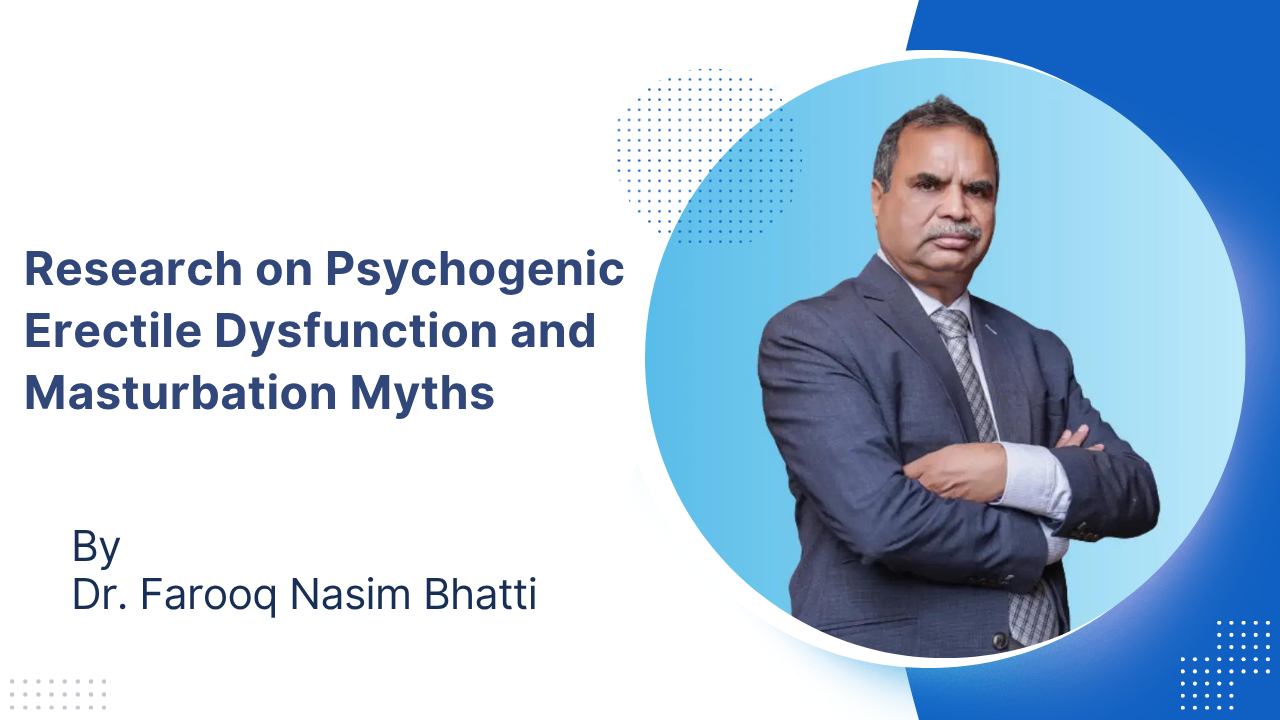
Erectile Dysfunction (ED) is a growing concern across South Asia and the Muslim world, but its causes are not always biological. In many men, emotional guilt, cultural shame, and misinformation about normal sexual behaviors contribute far more than physical disease. Recognizing this, Dr. Farooq Nasim Bhatti, Pakistan’s leading clinical sexologist and head of Nasim Fertility Center, presented a pioneering study titled “How Masturbation (A Taboo) Causes High Incidence of Psychogenic ED in Conservative Muslim Society” at the 26th Congress of the World Association for Sexual Health, held in Antalya, Turkey (2023).
This research examines the psychological damage caused by cultural taboos surrounding masturbation, showing how guilt and fear—not the act itself—lead to high rates of psychogenic ED among young men in conservative societies.
Understanding Psychogenic Erectile Dysfunction
Erectile dysfunction is generally divided into two types: organic and psychogenic.
Organic ED arises from physical causes such as diabetes, vascular disease, or hormonal imbalance.
Psychogenic ED, however, originates from emotional or mental factors—anxiety, guilt, fear of sin, or relationship conflict.
In conservative Muslim societies, where open discussion about sexuality is rare, men often grow up with distorted beliefs about normal sexual behavior. The act of masturbation is widely condemned as sinful or physically harmful. Young men are taught that semen is a “precious essence” and that losing it weakens the body, reduces manhood, or leads to infertility.
Dr. Bhatti’s research highlights how these cultural myths, reinforced by social silence, can create powerful internal conflicts that block natural sexual responses later in life.
The Taboo and Its Psychological Weight
In traditional settings, masturbation is not only frowned upon but also associated with deep moral guilt. Religious misinterpretations often portray it as a serious sin rather than a normal physiological outlet. Men who engage in it may feel unworthy, “impure,” or even fear divine punishment.
This guilt becomes chronic anxiety, manifesting as physical symptoms—rapid heartbeat, inability to sustain erection, and premature ejaculation. Over time, the brain begins to associate sexual arousal with fear rather than pleasure. The result is psychogenic ED, a condition rooted in emotion rather than anatomy.
As Dr. Bhatti notes, this cultural conditioning represents “a major cause of male sexual dysfunction” in conservative Muslim contexts.
The Research at Nasim Fertility Center
Between February 2022 and February 2023, Dr. Farooq Nasim Bhatti and his research team treated 430 men suffering from sexual dysfunction at Nasim Fertility Center, Lahore. Every patient underwent a comprehensive evaluation, including medical history, laboratory tests, and a detailed psychosexual assessment, to distinguish between organic and psychogenic causes.
Key Statistics
83 percent (357 patients) were diagnosed with psychogenic sexual dysfunction, meaning their problem was psychological rather than physical.
17 percent (73 patients) were found to have organic or physiological causes.
Among those with psychogenic ED, 86 percent were under 40 years of age, showing that the issue is increasingly prevalent among younger men.
Only 16 percent were over 40, indicating that misinformation and guilt often begin affecting men in their twenties and thirties.
These numbers reveal that the majority of sexual-health cases in such societies are not due to medical failure but emotional and cultural pressure.
Treatment Approach and Recovery
Once the underlying cause was identified, the treatment plan emphasized psychological rehabilitation over medication.
Core Interventions
Sex Therapy and Counseling – Individual and couple sessions helped patients understand the normal physiology of masturbation, correct misconceptions, and reduce guilt.
Cognitive and Behavioral Techniques – Re-training the mind to associate intimacy with calmness and affection rather than anxiety.
Pharmacological Support in Minimal Doses – When required, small therapeutic doses of SSRIs, benzodiazepines, Yohimbine, and vitamins were used to reduce anxiety and stabilize mood.
Physiological Aids – PDE-5 inhibitors, alprostadil, or mild topical applicants were prescribed only when necessary to support confidence and performance during early recovery.
Lifestyle Modification – Emphasis on regular exercise, balanced diet, and good sleep, all crucial for restoring hormonal balance and energy.
Remarkable Outcome
After only 10 weeks of treatment, 96 percent of patients regained a normal sexual response cycle.
This astonishing recovery rate demonstrates that when guilt and misinformation are replaced by knowledge and emotional healing, the body naturally regains its ability to respond.
Dr. Bhatti’s integrated approach—therapy + education + minimal medication—proved to be a sustainable model for sexual-health restoration.
Key Insights from the Study
Misinformation Is More Damaging Than the Act Itself
The research dismantles the common belief that masturbation weakens the body. The real harm lies in the fear and guilt created by false teachings.Young Men Are Most Vulnerable
The majority of psychogenic ED cases were men below 40, an age when sexual function should normally be at its peak. This shows the long-term mental imprint of early-life shame and misinformation.Sex Therapy Restores Confidence
Most patients recovered without needing heavy medication or invasive procedures. Simple education and structured counseling were enough to re-establish natural arousal pathways.Faith and Science Can Co-exist
The study encourages a balanced understanding—recognizing religious values while embracing scientific knowledge about human sexuality. Proper education helps believers practice faith without damaging their mental or sexual health.
The Need for Sex Education in Conservative Muslim Societies
Dr. Farooq Nasim Bhatti’s findings highlight a broader social issue: the absence of accurate sex education. In many conservative Muslim countries, sexual topics are rarely discussed within families, schools, or mosques. When information is absent, myths fill the gap.
Young men are told that nocturnal emissions or masturbation cause permanent weakness, infertility, or “loss of manhood.” These fears push them into cycles of shame, secrecy, and anxiety. Over time, these emotions manifest physically as psychogenic ED or premature ejaculation.
Introducing medically accurate, culturally sensitive education can change this narrative. Teaching the biological reality of sexual functions helps prevent guilt and promotes healthier marital relationships later in life.
Nasim Fertility Center has been a pioneer in this mission—offering private counseling and evidence-based education to thousands of patients who once felt trapped between faith and biology.
Global Significance of the Study
By presenting this paper at the World Association for Sexual Health (WAS 2023) in Antalya, Dr. Bhatti placed Pakistan on the map of international sexual-medicine research. His work bridges the gap between religious culture and medical science, offering a model that other Muslim societies can follow.
The study demonstrates that psychogenic ED is not a rare or localized problem—it’s a global psychosocial health challenge rooted in misinformation. Countries with similar cultural norms can benefit from adopting this holistic, counseling-first treatment model.
Conclusion
The high incidence of psychogenic ED in conservative Muslim societies is not a moral failure but a public-health concern driven by cultural silence and misinformation. Dr. Farooq Nasim Bhatti’s research provides clear evidence that guilt-based beliefs about masturbation directly contribute to sexual dysfunction—and that these effects can be reversed through education, empathy, and therapy.
By combining medical expertise with cultural understanding, Dr. Bhatti and the team at Nasim Fertility Center continue to lead Pakistan’s movement toward open, evidence-based sexual healthcare. Their mission is not only to treat dysfunction but also to empower men with accurate knowledge, self-respect, and renewed confidence.
Call to Action
If you are experiencing anxiety, guilt, or sexual-performance issues, reach out for a confidential consultation at Nasim Fertility Center.
- Clinics in Lahore | Islamabad | Faisalabad
- 0300-4577606 📧 nasimfertilitycenter@hotmail.com
Your health, confidence, and relationships deserve informed, compassionate care.
Reference
Muhammad Amir Farooq Nasim, Umer Farooq. How Masturbation (A Taboo) Causes High Incidence of Psychogenic Erectile Dysfunction in Conservative Muslim Society. Presented by Dr. Farooq Nasim Bhatti at the 26th Congress of the World Association for Sexual Health, Antalya, Turkey (2023).
Disclaimer
This information is for educational purposes and not the treatment. For treatment, you need to consult the doctor.

Dr. Farooq Nasim Bhatti (MBBS, FAACS – USA, Diplomate: American Board of Sexology, CST, HSC – Hong Kong, CART – Malaysia & China) is a qualified medical sexologist with 30+ years of experience. He has presented 21+ research papers internationally and treats sexual dysfunction through sex therapy, counseling, and pharmacotherapy to restore natural sexual function without temporary medication.

Regain Confidence with Our ED Solutions
Explore effective treatments for erectile dysfunction. Take charge of your intimacy today.


